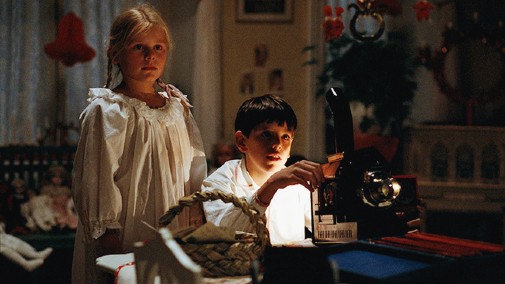1983 Flashback: The Best International feature race
 Friday, March 5, 2021 at 9:48PM
Friday, March 5, 2021 at 9:48PM 
Have you ever seen a film so good it makes you happy to be alive? For me, Ingmar Bergman's Fanny & Alexander is one of those films.
After I guested on the 2001 episode of The One-Inch Barrier, a podcast about the Best International Film category, the amazing Juan Carlos Ojano asked me to choose another year to do and I immediately knew I wanted to talk to him about 1983. Since last summer, I'm happy to say Juan Carlos and I have become friends, and there are few things I like to do more than sharing the movies I love with the people I love and there are few things I love more than Fanny & Alexander. I'd be even more joyful if you, lovely readers, could share in this lovefest for cinema. Join us as we travel back to the early 80s and talk about Bergman's legacy, World War II movies, the magic of dance on the big screen, and much more. Take a listen:
What do you think of this Oscar lineup? Are you as in love with Fanny & Alexander as I am or do you have another favorite from '83?



Reader Comments (5)
Rewatched Fanny & Alexander and Best Intentions back to back during quarantine and I still think about them.
I watch the miniseries version of F&A almost every Xmas. No film comes close to capturing the magic, the boredom, and the horror of childhood so well as it does.
Fanny and Alexander is my favorite film of all time.
I first saw the film almost 40 years ago in its initial run. I was overwhelmed and returned the next day to see it again. After innumerable screenings and discussions and readings, I have decided the for me the film explores, not childhood, but the memory of childhood that exists within ourselves as we age.
The film begins and ends at Christmas, a joyous time. This is the season where we tend to hold sweet recollections of family. We’d rather dismiss, forget, ignore the harsh realities of the death of a beloved family member, the bad choices of one who is responsible for loving, protecting us, and other truths. Fanny and Alexander helps us see that joy and sorrow mold us as individuals. The internal markings of experience are keys to self acceptance.
I relish Bergman’s embrace of magical realism. Statues move. Boxes hiding children are empty. Intense desire can prompt actions. People don’t leave when they die but live on within us. As we age the importance of imagination, creativity and emotion grows more urgent, not less. At the end of the film, the two women read from Strindberg’s A Dream Play in which the noted playwright abandoned realism embracing nuance that lends credence to a belief that anything can happen. While that is not necessarily positive, it is a truth.
I find solace in Bergman’s masterpiece. Like all great art, it is a work that grows richer as we experience it and find personal resonance.
Bergman finished his film career with an unadulterated masterpiece. It's a shame he didn't win a personal Oscar for his last theatrical release.
Me too, me too!
I co-sign everything James said.
And this was one of my family's annual Christmas viewings as well - I think the movie version, though, not the miniseries, on VHS. It is definitely my favorite Bergman, as his warmest and emotionally richest film. (Though the spooky gothic parts are as terrifying as anything from his other works.)
Also, because my dad was such a Bergman nut, we had a lot of Bergman-related books as well as his movies, including what I think was the original screenplay for F&A. I loved it and probably reread it even more times than I watched the movie.